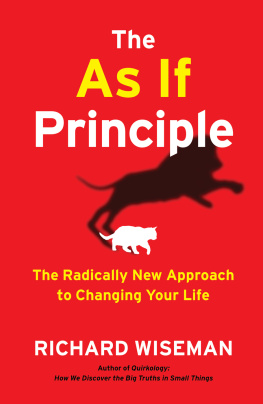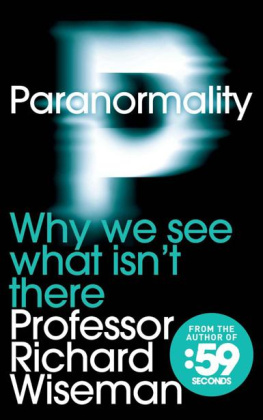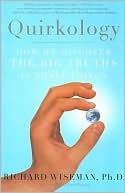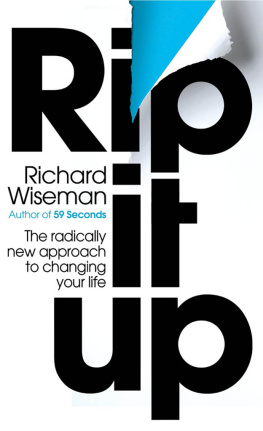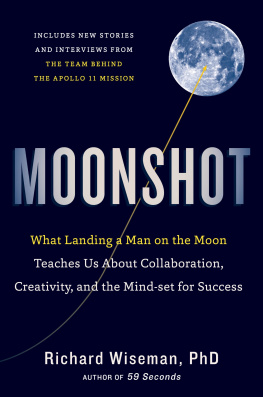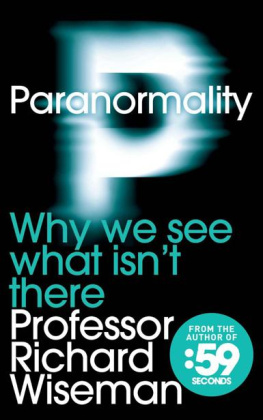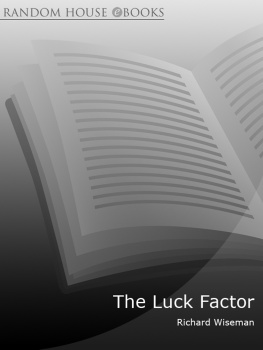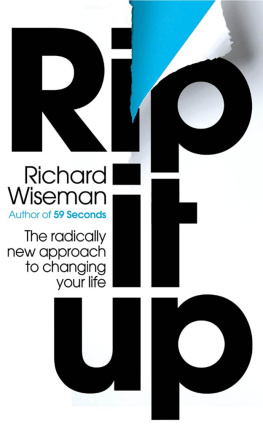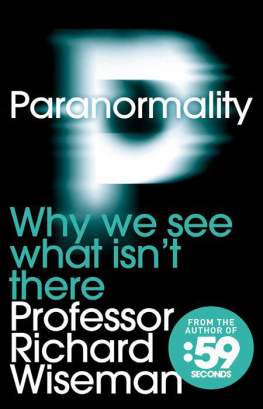Thank you for purchasing this Free Press eBook.
Join our mailing list and get updates on new releases, deals, bonus content and other great books from Free Press and Simon & Schuster.
C LICK H ERE T O S IGN U P
or visit us online to sign up at
eBookNews.SimonandSchuster.com

CONTENTS

To Ronald and Brenda

If you want a quality, act as if you already have it.
William James, 1884
A Brief Introduction

Its time for positive action
Self-help gurus and business coaches preach the same simple mantra: if you want to improve your life, you need to change how you think. Force yourself to have positive thoughts, and you will become happier. Visualize your dream self, and you will enjoy increased success. Think like a millionaire, and you will magically grow rich. In principle, this idea sounds perfectly reasonable. However, in practice, the approach often proves surprisingly ineffective, with research showing that people struggle to continually think happy thoughts, that employees remain unmoved by imagining their perfect selves, and that those dreaming of endless wealth fail to make millions.
Over a century ago, the brilliant Victorian philosopher William James proposed a radically different approach to change. Since then, researchers from across the world have carried out hundreds of experiments into Jamess theory and discovered that it applies to almost every aspect of peoples lives. Perhaps most important of all, the work has given rise to a series of easy and effective exercises that can help people feel happier, avoid anxiety and worry, fall in love and live happily ever after, stay slim, increase their willpower and confidence, and even slow the effects of aging. This research has been presented at countless scientific conferences and published in academic journals, but it has rarely made its way into the public domain.
In my previous book, 59 Seconds, I described a handful of these exercises. The As If Principle builds on this work by presenting the first accessible and comprehensive guide to Jamess radical theory. It reveals how everything you currently believe about your mind is wrong, shows that change does not have to be challenging, and describes a series of easy-to-implement techniques designed to improve several different areas of your everyday life.
Throughout the book you are going to be presented with interactive exercises that involve you changing your behavior. You might be tempted to read about these ideas but not actually put them into practice. This attitude is perhaps understandable (after all, behaviors quickly become ingrained in our minds and soon start to feel like old friends), but please resist the urge. This book is all about the impact that your actions have on your mind, and the exercises encourage you to actually experience these phenomena rather than just read about them.
You are about to encounter a new approach to change. An approach that is grounded in science, overturns conventional thinking, and provides a basis for the easiest, quickest and most effective ways of changing your life.
So sit up straight and take a deep breath. Forget all about positive thinking. Its time for positive action.
Chapter 1
How to Be Happy

Where we meet that adorable genius William James, turn the world upside down, learn how to create good cheer at will, and visit the fun factory
In the beginning was the deed.
Faust, Johann Wolfgang von Goethe

I. The Simple Idea That Changes Everything
The worlds first laboratory-based psychology experiment was carried out by the German psychologist Professor Wilhelm Wundt in 1879. This historic study was conducted in a small room at the University of Leipzig and reveals all you need to know about how Victorian scientists approached the human mind.
Wundt could have celebrated the birth of experimental psychology by investigating any fascinating topic of his choosing. Perhaps why people fall in love, believe in God, or sometimes feel the need to kill one another. Instead, the humourless and indefatigable Wundt chose to conduct a strange, even bizarre, experiment involving a small brass ball.
Wundt and two of his students gathered around a small table and connected a timer, a switch, and a carefully designed metal stand. A brass ball was then balanced on the stand, and one of Wundts students placed his hand a few millimeters above the switch. Seconds later, the ball was automatically released from the stand, and the timer sprang into action. The student slammed his hand down on the switch the moment that he heard the brass ball hit the table, which immediately halted the timer. By carefully recording the reading shown on the timer in his notebook, Wundt created psychologys first data point.
It would be nice to think that after a day or so of ball dropping, Wundt would have closed his notebook, reported his findings, and moved on to something more interesting. Nice, but wrong. In fact, Wundt spent the next few years of his life observing hundreds of people responding to the same test. In the same way that physicists were trying to identify the fundamental nature of matter, so Wundt and his team were attempting to discover the fundamental building blocks of consciousness. Some of the participants were asked to press the switch the moment they heard the ball hit the table, while others were told to react when they became fully aware of the sound. In the first scenario, observers were asked to concentrate their attention on the ball, and in the second, they were asked to focus more on their own thoughts. When the tasks were performed properly, Wundt believed that the first reaction would represent a simple reflex, whereas the second was more of a conscious decision. Perhaps not surprisingly, many participants initially struggled to recognize the alleged subtle difference between the two conditions, and so were required to complete more than ten thousand trials before moving on to the experiment proper.
After carefully wading through the resulting mass of ball-dropping data, Wundt concluded that the reflexive response took an average of one-tenth of a second and left the participants with a very weak mental record of the sound of the ball. In contrast, consciously hearing the sound produced an average reaction time of two-tenths of a second and resulted in a far clearer experience of the balls impact.
Having solved the mystery of the reflexive response, Wundt devoted the rest of his career to carrying out hundreds of similar studies. His approach proved surprisingly influential, and almost every other nineteenth-century academic dabbling in matters of the mind followed in his footsteps. In psychology laboratories across Europe, researchers could hardly hear themselves think for the sound of brass balls dropping onto tables.
Next page
